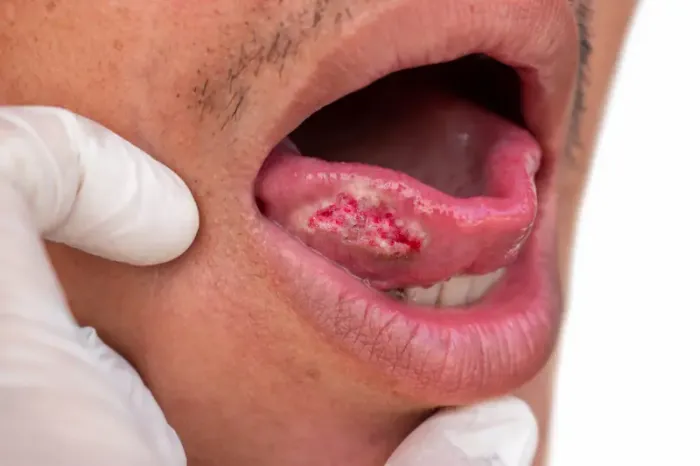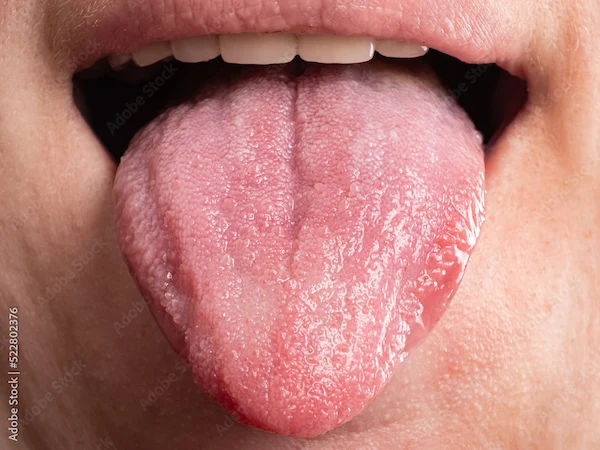Tongue Cancer Overview Symptoms and Treatment
Learn about the symptoms, causes, diagnosis, and treatment options for tongue cancer, along with recovery advice and prevention tips for better oral health.

Written by Dr. Mohammed Kamran
Reviewed by Dr. Dhankecha Mayank Dineshbhai MBBS
Last updated on 13th Jan, 2026

Cancer is a word that can bring fear and uncertainty, but understanding it better can help ease worries and guide you toward the right steps for care. Tongue cancer is a type of oral cancer that affects the tongue, making it difficult to speak, eat, or swallow if left untreated. The good news is that early detection and treatment can significantly improve outcomes.
This article will help you understand tongue cancer, its symptoms, causes, and treatment options in simple terms. We’ll also share tips on prevention and when to seek medical help.
What Is Tongue Cancer?
Tongue cancer occurs when abnormal cells grow uncontrollably on the tongue. It usually begins in the thin, flat cells (squamous cells) that cover the tongue’s surface. There are two main types:
1. Oral Tongue Cancer – Affects the front two-thirds of the tongue (the part you can move).
2. Base of the Tongue Cancer – Affects the back third of the tongue, near the throat.
While it can be serious, early detection and treatment can lead to successful recovery.
Common Symptoms of Tongue Cancer
Recognizing the signs early can make a big difference. If you notice any of these symptoms persisting for more than two weeks, consult a doctor:
• A sore or ulcer on the tongue that doesn’t heal
• Red or white patches on the tongue
• Persistent pain in the tongue or mouth
• Difficulty swallowing or chewing
• A lump or thickening on the tongue
• Numbness in the mouth or tongue
• Unexplained bleeding from the tongue
• Ear pain (referred pain from the tongue)
• Change in voice or speech difficulties
If you experience any of these symptoms, don’t ignore them. Early medical advice can help in proper diagnosis and treatment.
What Causes Tongue Cancer?
While the exact cause isn’t always clear, certain factors increase the risk:
• Tobacco Use – Smoking cigarettes, cigars, or chewing tobacco significantly raises the risk.
• Heavy Alcohol Use – Excessive drinking, especially when combined with tobacco, increases chances.
• HPV Infection – Some strains of the human papillomavirus (HPV) are linked to tongue cancer.
• Poor Oral Hygiene – Long-term gum disease or missing teeth may contribute.
• Unhealthy Diet – Lack of fruits and vegetables can weaken the body’s defenses.
• Age and Gender – More common in people over 40 and in men.
How Is Tongue Cancer Diagnosed?
If your doctor suspects tongue cancer, they may recommend:
1. Physical Examination – Checking the tongue, mouth, and throat for abnormalities.
2. Biopsy – Removing a small tissue sample for lab testing.
3. Imaging Tests – CT scans, MRIs, or PET scans to see if cancer has spread.
Early diagnosis is key, so don’t delay seeing a specialist if you notice symptoms.
Get Your Symptoms Checked now
Treatment Options for Tongue Cancer
Treatment depends on the cancer’s stage, location, and overall health. Common options include:
1. Surgery
• Removing the tumor and some surrounding healthy tissue.
• In advanced cases, part of the tongue may need removal (partial glossectomy).
2. Radiation Therapy
• High-energy beams target and kill cancer cells.
• Used alone for early-stage cancer or after surgery to prevent recurrence.
3. Chemotherapy
• Powerful drugs kill cancer cells or stop their growth.
• Often combined with radiation for better results.
4. Targeted Therapy & Immunotherapy
Newer treatments that help the immune system fight cancer.
Your doctor will discuss the best approach based on your condition.
Living with Tongue Cancer: Tips for Recovery & Prevention
Recovery depends on the stage of cancer and treatment. Here’s how you can support your health:
After Treatment Care
• Follow-up Visits – Regular check-ups to monitor recovery.
• Speech Therapy – Helps regain speaking ability if surgery affects speech.
• Nutritional Support – Soft or liquid diets may be needed initially.
Prevention Tips
• Quit Smoking & Limit Alcohol – Major risk reducers.
• Maintain Oral Hygiene – Brush, floss, and visit the dentist regularly.
• Eat a Healthy Diet – Fruits, vegetables, and whole grains boost immunity.
• Get Vaccinated for HPV – Reduces risk of HPV-related cancers.
• Regular Self-Exams – Check your mouth monthly for unusual changes.
When to See a Doctor?
If you notice any persistent symptoms like mouth sores, lumps, or difficulty swallowing, don’t wait. Early detection saves lives.
Need Help? Consult a Specialist Today
If you or a loved one is experiencing symptoms of tongue cancer, booking a consultation with an oncologist or ENT specialist is crucial. Apollo 24|7 offers easy online appointments and expert care.
Take the first step toward better health, schedule a consultation today!
Final Thoughts
Tongue cancer can be daunting, but awareness and timely action make a big difference. By recognizing symptoms early, adopting a healthy lifestyle, and seeking medical advice promptly, you can improve outcomes and maintain a good quality of life.
Would you like to book a consultation or learn more? Visit Apollo 24|7 for expert guidance and support.
Consult Top Specialist
Consult Top Specialist

Dr. Nishant Rana
Ent Specialist
8 Years • MBBS. MS ENT
Delhi
Apollo Hospitals Indraprastha, Delhi
Dr. Vaishnavi Bommakanti
Ent Specialist
9 Years • DNB
Secunderabad
Apollo Hospitals Secunderabad, Secunderabad

Dr. Riya Das
Ent Specialist
8 Years • MBBS, MS ENT(oto rhino laryngology)
Kolkata
MCR SUPER SPECIALITY POLY CLINIC & PATHOLOGY, Kolkata

Dr. Riya Das
Ent Specialist
8 Years • MBBS, MS ENT(oto rhino laryngology)
East Midnapore
VIVEKANANDA SEBA SADAN, East Midnapore

Dr. Spandita Ghosh
Ent Specialist
7 Years • MBBS, MS
Kolkata
Health Connect, Kolkata



